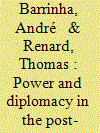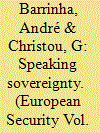| Srl | Item |
| 1 |
ID:
172557


|
|
|
|
|
| Summary/Abstract |
It is becoming widely accepted that we have transitioned, or are now transitioning, from an international liberal order to a different reality. Whether that reality is different solely in terms of power dynamics, or also in terms of values and institutions, is up for discussion. The growing body of literature on ‘post-liberalism’ is used as an entry-point for this article, which aims to explore how the post-liberal transition applies to cyberspace. We explore how power dynamics are evolving in cyberspace, as well as how established norms, values and institutions are contested. The article then looks at the emergence of cyber diplomacy as a consequence and response to the post-liberal transition. As it will be argued, if cyberspace was a creation of the liberal order, cyber-diplomacy is a post-liberal world practice. What role it plays in shaping a new order or building bridges between different political visions, and what it means for the future of cyberspace, will constitute key points of discussion.
|
|
|
|
|
|
|
|
|
|
|
|
|
|
|
|
| 2 |
ID:
187077


|
|
|
|
|
| Summary/Abstract |
The EU’s revised Cybersecurity Strategy (2020) has been constructed in the context of increasing geopolitical tension and within a dynamically evolving technological environment. The onset of new technologies has brought with it new opportunities but also perceived risks and threats in cyberspace, to which the EU has sought to elicit a more comprehensive approach underpinned by a move to become more “technologically sovereign”. We seek in this article to critically unpack what such claims to technological sovereignty mean for the EU in the cyber domain and what the practical implications are of the EU taking ownership of and performing sovereignty. More specifically, in seeking to conceptually unpack technological sovereignty in its internal and external manifestations, we show how its articulation, legitimisation and operationalisation has implications and consequences for the EU’s identity and action in the cyber domain.
|
|
|
|
|
|
|
|
|
|
|
|
|
|
|
|